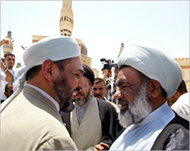300 detained in Iraq military offensive
A major US and Iraqi offensive against anti-government fighters in Baghdad’s western Abu Ghraib district has resulted in the detention of 300 people, according to the US military.

The US military said on Monday that the detained Iraqis were suspected fighters opposed to the presence of foreign troops in Iraq.
On Sunday, seven battalions of Iraqi troops and police, backed by US forces, cordoned off areas of western Baghdad and searched “suspected terrorist locations”, a US military statement said.
The operation, codenamed Sqeeze Play, was launched, according to the US militray, to “minimise insurgent activity in western Baghdad”, including Abu Ghraib, and was focusing on an area where fighters have launched numerous attacks along the 16km airport road and against the US-run detention facility located there.
Airport road is a dangerous strip of highway leading from Baghdad International Airport to the capital’s downtown district. It is the scene of regular attacks aimed at US and Iraqi forces, and foreigners.
Scattered violence
In northern Baghdad, a car bomb exploded near a school, but there were no reports of casualtie, Aljazeera said.
In al-Amal quarter, west of Baghdad, six Iraqi civilians were killed after mortar shells fell on their house.
An Iraqi civilian was killed and another wounded when an improvised explosive device went off in al-Rashaad district, west of the northern city of Kirkuk, Aljazeera added.
Also on Sunday, a US soldier was killed in a vehicle accident in northern Iraq, the military said.
Elsewhere, a car bomber blew himself up near a US convoy and police station in Tikrit, 80 miles north of Baghdad, wounding three US soldiers and two Iraqi policemen, military spokesman Major Richard Goldenberg said.
Shia-Sunni meeting
In other developments on Sunday, senior aides of anti-US cleric Muqtada al-Sadr met a key Sunni group in a bid to soothe tensions that have flared and resulted in the death of 10 Shia and Sunni clerics in the past two weeks, Aljazeera reported.
 |
|
Sunni-Shia clerics met to agree |
The two delegations met at the Um al-Qura mosque, the headquarters of the Association of Muslim Scholars (AMS), west of Baghdad.
The head of the AMS, Harith al-Dhari, handed over a document on mediation to a committee delegated by al-Sadr, which attempted to bridge the differences between the AMS and the Badr Brigades.
The AMS has accused the Badr Brigades of assassinating its imams and worshipers. Several Sunni clerics were killed just last week.
Brigades’ General Secretary, Hadi al-Amri, has denied the charge and accused the Sunni association of wanting to “push Iraq into a sectarian conflict”.
Al-Sadr’s return
Al-Sadr said in a television interview aired on Sunday that the talks were aimed at settling the feud between the AMS and the Badr Brigades.
He re-surfaced this week after keeping a lower profile following fierce battles last year in the southern holy city of Najaf and Baghdad’s impoverished Sadr City between his supporters and the US forces.
Al-Kubaisi, the Sunni association official, said he handed al-Sadr’s delegation a document committing his group to certain steps; but he did not elaborate. More meetings with al-Sadr’s group will be held in the future, he said.
Sunni leaders announced on Saturday that they had formed an alliance of tribal, political and religious groups to help Iraq’s once dominant minority break out of its deepening isolation following a Shia rise to power after Saddam Hussein’s ouster.